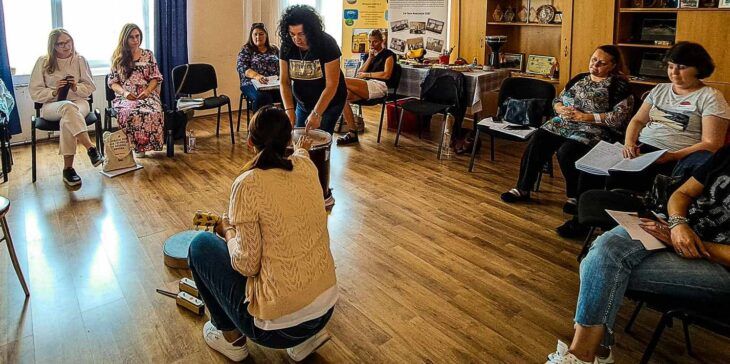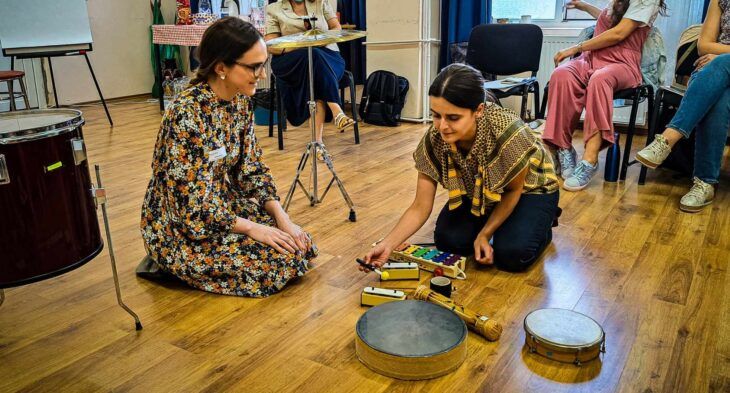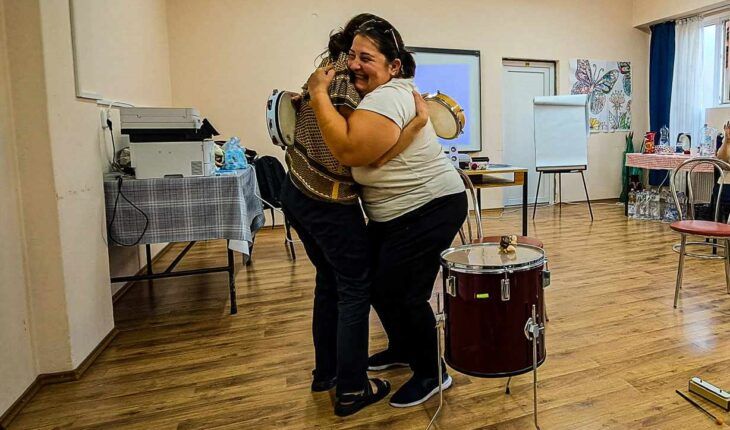Our first locally-led Intensive Study Training
Romania
- Caregivers
- Children
- Disability
- Distance Learning Programme

Citiți această postare în Română.
On the 30th of September and the 1st of October, Romania’s Distance Learning Programme (DLP) hosted its Intensive Study Training (IST) weekend. This year’s IST brought significant changes, with a shift in roles, which this blog post aims to explore.
The IST Experience: Bridging Theory and Practice
The Distance Learning Programme in Romania took shape over a decade ago and has a long history of training music therapy enthusiasts interested in working with young children having learning difficulties. It comprises two main elements, the theoretical and the practical part, spread across nearly a year. The two elements are connected by a key moment of the programme: the Intensive Study Training (IST). This year’s IST took place in Oradea: A weekend packed with learning and experiences where students and trainers got together to connect the theory with the practice. This year, the weekend welcomed nine students and three facilitators—however, some significant changes made this IST special, which I’ll discuss later in this blog.
The Online Tutorials
Before participating in the intensive face-to-face training, the students completed a series of 8 comprehensive online tutorials, which are meant to provide a strong foundation for their learning. I perceive the IST as an opportunity for the students to get the “A-ha!” moments they need in order to clarify the robust theories explored in the online tutorials. During the IST, the students gave positive feedback on how the video examples used during the weekend enabled them to make links with the tutorial content they had received earlier in the course. They also reflected on the importance of revising and clarifying what we had explored together and found creative ways of summarising their learning. As always, co-leading the IST reminded me of why it’s called ‘intensive’; we covered and discussed many theoretical and practical aspects of what it is like to run a music session. It was pretty overwhelming! However, the thought of those delicious pizzas waiting for us at lunchtime each day always helped recharge our energy.
The Practical Assignment
Looking back at the students’ online learning is important, but the Practical Assignment, which follows, is equally crucial, and the IST helped the students prepare for it. This part involves delivering a series of eight sessions to a group of young children. The IST was an excellent opportunity for the students to ask all their specific questions, anticipating their practical assignment. Moreover, the weekend is their only chance to experience what it’s like to be the music session leader… or the child.

About Experiential Learning through Role-Play
This year’s students thoughtfully shared ideas about how to support some of the children in their groups. Moreover, the weekend included opportunities for role play, when the students could experience being a music session leader (adult) or participant (child) and experience for themselves what this feels like. Interestingly, most students emphasised that one of the main things they learned was “how to step into the children’s shoes” and be more empathetic. Where there might have been a little hesitancy to participate in the practical activities on Day 1, by Day 2, the students were throwing themselves into it bravely. This was a fantastic chance to see a glimpse of what their music groups might look like.
Personal Reflection: A Special IST
The Intensive Study Training holds a special place in my heart. I have had the opportunity to participate in four ISTs so far. The first one was as a DLP student myself, back in 2019, and for the next three, I was fortunate enough to be part of the training team (while I completed my professional music therapy training in the UK). My involvement with the IST has gradually evolved over the years, but this year’s training was particularly memorable. As the new DLP Coordinator, a position I started in May, I had greater responsibility for aspects of teaching and some administrative tasks. I stepped in Alexia’s shoes, thinking about time-keeping, preparing handouts, handling technical aspects, and other paperwork.
Taking a step forward (and a step back)
Previously, during my journeys to Oradea, I enjoyed stimulating conversations with Alexia, MasT’s director, who resiliently helped deliver projects in Romania from 1995… until this year. There’s the first big change!
Although Alexia did not deliver the IST in person, she remained essential. Alexia supported us in preparing and facilitating the IST and joined us via Zoom on Sunday afternoon on our second training day. What an insightful experience!
Alexia’s Romanian is excellent, and she can understand us without difficulties. In the last few years, I’ve noticed many students being impressed by how she can express herself admirably in Romanian. Seeing her interest and dedication in embracing our language (and culture) means a great deal. In previous years, the ISTs would be bilingual – involving a mixture of English and Romanian, and I often felt that translation had a unique effect, strengthening the students’ learning through repetition.
The Zoom call and translating for Alexia again felt like an element of connection to the IST’s past. However, not having Alexia with us made the IST feel… different from what we were used to. This emphasised the other significant difference for this year’s IST: As Alexia took a step back, the Romanian training team took a step forward.
There’s the other big change!

Romania has been fortunate to have benefited from MasT’s projects for a long time. Alexia and many other music therapists on the charity’s Advisory Panel have been essential in delivering the training so far. However, the charity has always taken great care to support and encourage the development of Romania’s own music therapy practice, ready to step back when the time was right. This year, MasT contributed to the steps forward that have been taken locally with respect to music therapy in Romania, appointing, training and supporting a team of Romanian professionals to run the DLP.
For this IST, the facilitators were Monika (the course moderator with a long history in her role), Eli (recently appointed as the course’s supervisor), and I as the new DLP Coordinator.
Monika, played a crucial role as the course moderator and the lead trainer of the IST, helping with consistency through a time of change. Monika proved to be a pillar of support for the students. Since February, she meticulously moderated their written assignments, which helped her build strong connections with each student. By the IST, Monika knew about their progress, circumstances, and was aware of their fears, and hopes, which allowed her to bring the group together during the weekend through strong interpersonal links. Monika and the partnership between MasT and her association, Sound Art E-motion, has been key to strengthening the local recognition of the DLP (it is now accredited by Colegiul Psihologilor din Romania). Having limited experience, Eli and I appreciated all of Monika’s efforts throughout the IST, particularly given she was feeling unwell!
Working alongside Monika and me, Eli brought so much joy, expertise, and dedication to the IST. Eli has recently been appointed as the course supervisor and will support the students in doing their practical assignments over the next few months by providing them with online supervision. Eli’s new role is another important milestone for the DLP – it is the first time the course supervisor is Romanian. Besides fulfilling Music as Therapy International’s vision of ‘handing’ the DLP to Romanian professionals, this has positive implications for music therapy in Romania’s development, too. Here are some thoughts from Eli:
As an Oradea-based Romanian music therapist, I am delighted to have the opportunity to collaborate with MasT and be involved as a supervisor and facilitator in the Distance Learning Programme and the IST.
It was wonderful getting to know the participants and playing a small part in preparing a new generation of music as therapy practitioners and partners, and ultimately making the benefits of music therapy available more widely in Romania. I look forward to facilitating the supervision for the DLP practical assignments.
Eleonora Rosca, Course Supervisor
Acknowledgements
I’d like to take this opportunity to thank the UK team: Alexia, Kiran and Makeda, who are doing a wonderful job helping the students while constantly improving their learning environment.
Before I wrap things up, I would like to take a moment to acknowledge Magda’s contribution to the DLP, who has been an integral part of MasT for many years. As I take on her responsibilities, I feel honoured and grateful for the opportunity to follow in her footsteps. To conclude, here are some reflections from Magda on her time working with the charity.
It is time for me to say goodbye. It was a real pleasure to be with you. I wish you all the best and beautiful moments of connection through music in the practical part of the course.
Magda Pata
